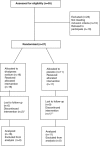Divalproex sodium vs placebo for the treatment of irritability in children and adolescents with autism spectrum disorders
- PMID: 20010551
- PMCID: PMC2846602
- DOI: 10.1038/npp.2009.202
Divalproex sodium vs placebo for the treatment of irritability in children and adolescents with autism spectrum disorders
Abstract
Autism spectrum disorders (ASDs) are neurodevelopmental disorders characterized by social and language deficits and by repetitive behaviors and interests. Irritability/aggression is a significant comorbid symptom in this population, which greatly impacts burden of care. This study examined the effect of divalproex sodium for irritability/aggression in children and adolescents with ASD. This was a 12-week randomized, double-blind, placebo-controlled trial. All efficacy measures were obtained by an independent evaluator blinded to randomization condition and side effects. A total of 55 subjects gavetheir consent and 27 were randomized in a 1 : 1 manner (mean age 9.46+/-2.46, mean nonverbal IQ 63.3+/-23.9). Two subjects from the active group and one subject from the placebo group discontinued the study because of either a lack of efficacy or side effects (increased irritability). Primary outcome measures were Aberrant Behavior Checklist-Irritability subscale and Clinical Global Impression-Improvement, which focused on irritability. Overall, 62.5% of divalproex subjects vs 9% of placebo subjects were responders (CGI-irritability OR: 16.7, Fisher's exact p=0.008). A statistically significant improvement was also noted on the ABC-Irritability subscale (p=0.048). There was a trend for responders to have higher valproate blood levels compared with nonresponders. This study suggests the efficacy of divalproex for the treatment of irritability in children and adolescents with ASD. Larger sample follow-up studies are warranted.
Figures


References
-
- Allen MH, Hirschfeld RM, Wozniak PJ, Baker JD, Bowden CL. Linear relationship of valproate serum concentration to response and optimal serum levels for acute mania. Am J Psychiatry. 2006;163:272–275. - PubMed
-
- Aman M, Singh N, Stewart A, Field C. The aberrant behavior checklist: a behavior rating scale for the assessment of treatment effects. Am J Ment Defic. 1985;89:485–491. - PubMed
-
- Aman MG. Management of hyperactivity and other acting-out problems in patients with ASD spectrum disorder. Semin Pediatr Neurol. 2004;11:225–228. - PubMed
-
- American Psychiatric Association 1994Diagnostic and Statistical Manual of Mental Disorders: DSM-IV-TR4th edn.American Psychiatric Association: Washington, DC
-
- Amiet C, Gourfinkel-An I, Bouzamondo A, Tordjman S, Baulac M, Lechat P, et al. Epilepsy in autism is associated with intellectual disability and gender: evidence from a meta-analysis. Biol Psychiatry. 2008;64:577–582. - PubMed
Publication types
MeSH terms
Substances
Grants and funding
LinkOut - more resources
Full Text Sources
Other Literature Sources
Medical

